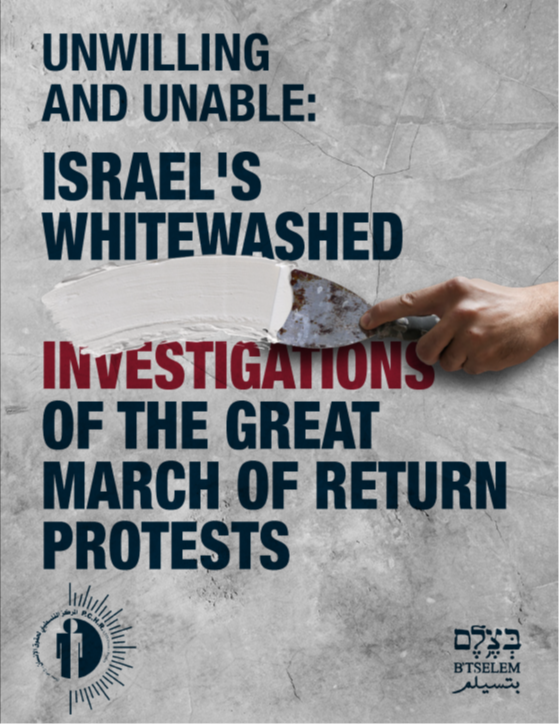B’Tselem and PCHR Report: “Unwilling and Unable”
Israel’s Whitewashed Investigations of the Great March of Return Protests
In a joint report published today, the Palestinian Centre for Human rights (PCHR) and B’Tselem analyze the investigations Israel claims to have conducted following the Great March of Return protests, which were held for about a year and a half in the Gaza Strip as of March 2018. The report shows how Israel worked to whitewash the truth and protect the political and military officials responsible – instead of taking action against the individuals who devised and implemented the unlawful open-fire policy, which resulted in the killing of more than 200 Palestinians and the injury of some 8,000 others.
Israel was quick to announce it is investigating the protests, primarily due to the proceedings underway at the International Criminal Court in the Hague. The reason for the announcement lies with one of the ICC’s guiding principles – the principle of complementarity, which means the Court will assert jurisdiction only when the state in question is “unwilling or unable” to carry out its own investigation. Once a state has investigated the incidents, the Court will not intervene.
However, declaring an investigation is underway is not enough to stave off intervention by the ICC. The investigation must be effective, be directed at the higher-ranking officials responsible for devising and implementing the policy, and lead to action against them. Israel’s investigations in relation to the Gaza protests do not meet these requirements. They consist entirely of the military investigating itself and have not examined the unlawful open-fire policy regulations handed down to security forces or the policies implemented during the protests. Instead, they focus exclusively on lower-ranking soldiers and on the question of whether they acted contrary to these illegal orders.
Moreover, while the protests were taking place, Israel’s Supreme Court heard petitions contesting the legality of the open-fire policy. The justices dismissed the petitions and allowed the military to continue employing this policy. However, it did not uphold the regulations being implemented in the field – as these were never presented to the Court. The Court only approved the regulations that the state claimed the military was following, ignoring the glaring disparity between the state’s claims and reality on the ground. By the time the petitions were heard, dozens of protesters had been killed and almost 2,000 injured.
The military law enforcement system has fallen short of fulfilling even the limited role assigned to it – investigating “exceptional incidents” only. The military arbitrarily decided to investigate only cases in which security forces had killed Palestinians, providing no explanation for this decision. The thousands of incidents in which Palestinians were injured – some so gravely they were left paralyzed or had to undergo amputations – were left uninvestigated.
The number of people wounded in these protests is almost unfathomable: a total of 13,457 Palestinians, 8,079 of them wounded by live fire, 2,424 by rubber-coated metal bullets, and 2,954 by tear gas canisters that hit them directly. Of the wounded, 155 suffered injuries resulting in amputation. None of these injuries is being investigated.
According to figures the IDF Spokesperson supplied B’Tselem, as of 25 April 2021, the General Staff Mechanism for Fact-Finding Assessments had received 234 cases in which Palestinians were killed. This figure includes Palestinians who were killed during the period in which the protests were held, but with no connection to them. The Mechanism completed its review in 143 of these cases and transferred them to the Military Advocate General (MAG) Corps. The MAG ordered the Military Police Investigation Unit (MPIU) to investigate 33 of the cases, as well as three other cases not handled by the Mechanism. In four cases, the investigation was closed with no action taken. The MAG opted not to criminally investigate 95 cases in which the Mechanism had completed its review, and closed the files with no further action. All other cases transferred to the MAG are ongoing. Only one MPIU investigation – into the killing of 14-year-old ‘Othman Hiles – resulted in an indictment being filed against a soldier. He was convicted in a plea bargain of the minor disciplinary offense of “abuse of authority to the point of endangering life or health” and sentenced to one month’s military community service.

